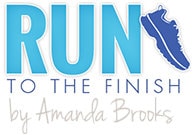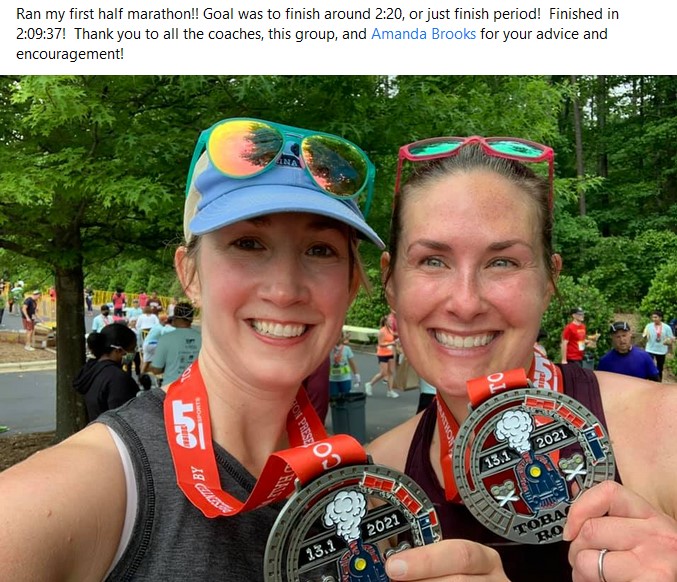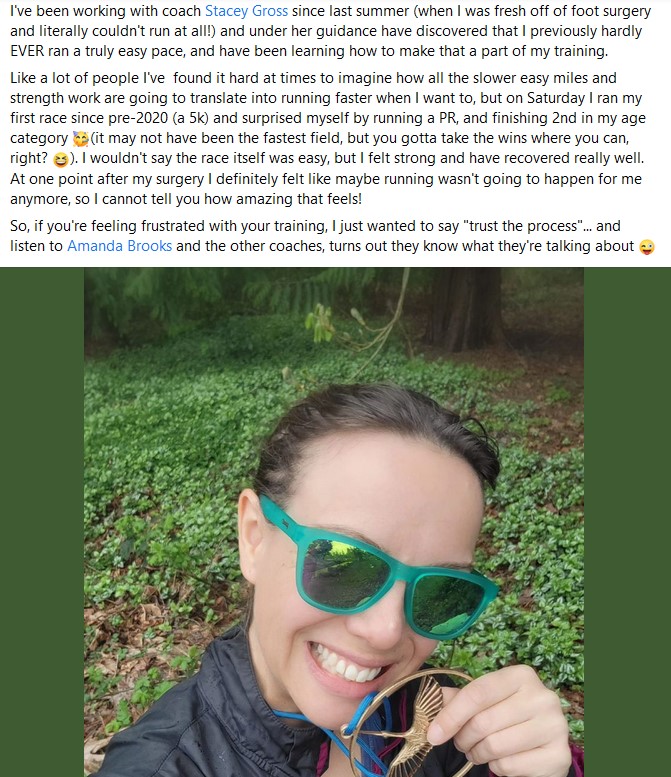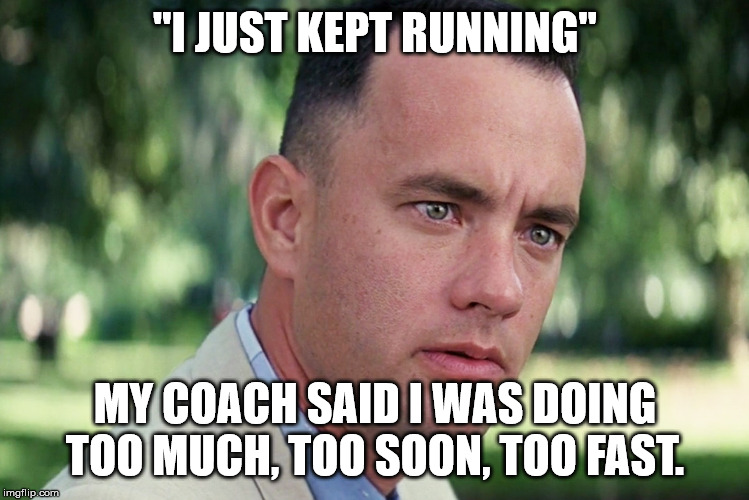Working with a running coach may appear to be a luxury reserved only for elite runners whose lives are dependent on performance, and an extravagance for every day, middle-of-the-pack runners.
And that’s where the hang-up is.
The reality is that the vast majority of the running community is made up of everyday runners who enjoy the sport, but don’t run for a living. But we tend to think it’s for someone else because we’ve got all kinds of ideas about our speed, our distance, our history, our injuries, and everything else!
No matter how ‘average’ a runner you are, you still have your own motivations for running and your own goals to work toward. We may all reach a point in our running journeys where we need guidance from a running coach, no matter how fast or slow we are or how much experience we have.
As a running coach, let me illuminate a few things for you right off the bat:
- The only judgment about your running is from you (and trust me we’ve all been there).
- Coaches freaking LOVE helping you hit your goals.
- There is a coach for every need!! (below I’ll help you figure out what’s right for you)
So whether you’re trying to figure out if you’re ready to hire a running coach, what to for in a potential coach, or how to even find a running coach to begin with, this article has you covered! I’ll go over all of that so that by the end of it, you know everything you need to find the right running coach for you.
Actually wanting to learn how to become a running coach?? <<— Check that out.
How to Know You’re Ready for a Running Coach?
Turns out this question has absolutely nothing to do with your pace and everything to do with your desire to hit your goals. Let’s see exactly what that means though.
Runners often ask me if they should consider a coach and I run them through a list when helping them decide if it’s the right time or not:
If you’re wondering whether you’re ready to work with a running coach, here are some signs that might indicate it’s time to seek out a coach:
You want one: If thinking about hiring a coach excites you and makes you feel more confident in being able to reach your goals, it might be time to finally make that investment in yourself.
You’re new to running: If you’re new to running, then that’s a great time to hire a running coach! Your coach can help you get started on the right foot, by providing guidance on proper form, training techniques, and injury prevention.
You’re looking for a customized training plan: If you’ve already tried free training plans online and now want to use one that’s completely customized to you, your life, your injuries, your foot type, and your schedule, then a running coach can do wonders for you!
You want to avoid injury: A good running coach will be skilled in not only help make sure you’re not going to push yourself too far and get injured but also watch out for the warning signs of a potential injury.
You’re feeling overwhelmed: If you’re feeling overwhelmed by the amount of information available about running and training, a coach can help you cut through the noise and focus on what’s most important for your goals.
You’re stuck in a training rut: If you feel like you’re not making progress in your training, or you’re struggling to break through a plateau, a coach can help you identify areas where you can improve and provide guidance on how to do so.
You’re training for a specific event: If you’re training for a race or other event, a running coach can help you prepare effectively, by creating a training plan tailored to the specific demands of the event and race terrain.
You’re recovering from an injury: If you’ve recently been injured, a coach can help you develop a safe and effective recovery plan, and provide guidance on how to prevent future injuries.
You want to take your performance to the next level: If you’re a seasoned runner and you want to improve your performance, a running coach is an ideal option! They can provide the guidance and expertise you need to take your training to the next level!
When Not to Get a Running Coach?
There are in fact times when I’ve turned people away from our coaching services. Sometimes it’s just not the right time!
While working with a running coach can be beneficial for many runners, it’s not always necessary or the right fit for everyone. Here are some signs that you may not be ready to work with a running coach:
You’re not willing to be accountable: If you’re not willing to be accountable to a coach, or you’re not willing to listen to their advice and make changes to your training plan, a coaching relationship may not work for you.
You don’t have the time or resources: If you don’t have the time or resources to commit to a coaching relationship, it may not be the right time to work with a coach. Coaching often requires a significant time and financial investment, so it’s important to be realistic about what you can commit to.
You want one because everyone else has one: If you’re thinking of hiring a running coach just because everyone else around you has one, then you’re probably not ready yet.
You think a coach is going to do the work for you: If you feel that by hiring a coach you’ll magically fix your weak hips or hit that PR you’ve been dreaming of, then you’re probably not ready for one. They’ll share their expertise, guidance, and plans with you, but you need to be willing to put in the work.
You’re not committed to your running goals: If you’re not fully committed to your running goals or you’re not willing to put in the work to achieve them, a coach may not be the best investment for you.
You’re still figuring out your running goals: If you’re still in the process of figuring out your running goals, a coach may not be the best investment until you have a clearer idea of what you want to achieve.
You don’t like being told what to do: If you’re the type of person that totally hates being told what to do, then a running coach might not work out so well for you.
11 Reasons to Consider Hiring a Running Coach
If you’re still unsure as to whether a running coach is right for you, here are the top 10 reasons why you should consider hiring a coach:
1. Help with Accountability
One of the main benefits of hiring a running coach is accountability. When you work with a coach, you are less likely to skip workouts or deviate from your training plan.
A coach will help you stay on track with your goals, and hold you accountable for your progress. Plus, knowing that you have a running coach monitoring your progress can provide the extra motivation you need to stay committed to your training plan.
2. Simplify Running Techniques and Jargon
Fartlek? Interval training? Tempo runs? Recovery runs? Yep, it can feel a bit overwhelming when you first start running or start looking into all the running lingo out there.
But the fact of the matter is that it’s important to understand these and work on them so that you can improve you running performance and hit all your goals.
That’s where a running coach is perfect for you. Not only will they simply everything there is to running, but you can ask questions and clarify anything you don’t understand.
3. Create a Personalized Training Plan
Another benefit of working with a running coach is that they will create a personalized training plan designed to fit your current fitness level, goals, as well as your schedule.
This will help to not only make sure that you are training effectively and efficiently but also ensure that you’re not overtraining and running the risk of getting injured.
A personalized plan takes into account your current fitness level and specific goals. This helps make sure that you are training in a way that is both safe, healthy, and effective.
4. Improve Running Technique and Form
A running coach can help you improve your running technique and form which definitely goes a long way! Proper form and technique are absolutely essential for running efficiently and staying injury-free.
A coach can help you identify areas where you may be compensating or using improper form, and provide the guidance you need to correct these issues. By improving your form, you can increase your efficiency and reduce your risk of injury.
5. Help Prevent Injuries
If you have tried to train on your own in the past but have consistently been sidelined by injuries before you ever reach the starting line, it may be time to consider hiring a certified running coach.
Overuse injuries are unfortunately common, but a coach will make sure you’re not taking unnecessary risks by increasing your training volume or intensity too quickly.
A skilled coach should also be able to advise you on all elements of injury prevention. This includes ensuring you aren’t racing too frequently or that you are balancing sleep, recovery, nutrition, and stress outside of training.
6. Set Realistic Race Goals
Setting realistic race goals is essential when running, and a running coach can help you do just that. A coach can help you come up with an achievable goal that will challenge your current abilities while still providing some room for improvement.
Your coach will be able to analyze your current fitness level and performance, as well as discuss any previous races and PRs, in order to determine what is a realistic and achievable goal.
They’ll also be able to help you break down larger goals into smaller, achievable milestones, which can help keep you motivated and on track.
7. Help Train for Specific Goals Goal
Another great thing about hiring a running coach is that he or she will take the guesswork out of your training by recommending specific workouts, paces, and distances to help you reach your goal.
Also, a coach is more likely to be realistic about how long it will take you to reach your goal. For example, they won’t promise a new runner that has only run a 5K that they can Boston qualify in their first marathon.
8. Provide Personalized Feedback
A running coach can provide personalized feedback on your performance and progress. They can help you identify areas where you may be struggling or falling behind, and provide guidance on how to improve.
This personalized feedback can be especially helpful for runners who are looking to improve their performance or are struggling to achieve their goals.
9. Help Improve Race Performance
Having a running coach can help you reach your racing goals, but it can also help you improve your performance on race day. A running coach will be able to provide guidance on how to best prepare for your race, as well as advice on fueling and pacing strategies during the actual event.
What’s best is that you can ask them just about anything because they’ve been through it all themselves, or helped a client who has. This means you don’t have to worry about figuring out all that there is to porta-potties, or where to stand in the starting line coral – they’re there for you for all your questions!
10. Assist in Time Management
Time management is an important aspect of training for any kind of running event. With the right time management skills, you’ll be better prepared to stay on track and reach your goals.
A running coach can help you develop a plan that works with your schedule and allows you to get enough rest, fuel your body properly, and still have time for other activities.
Your coach will work with you to help you understand what you need to do, when you should do it, and how much time it will take.
11. Provide Necessary Support and Encouragement
Having a running coach can provide the necessary support and encouragement needed to reach your goals. Your coach will be there to motivate you, help keep you accountable, and celebrate the successes you experience along the way.
Your coach will also be able to provide helpful advice that is tailored specifically to you and your individual needs. And so, they’ll be able to recognize when you need to be pushed and when you need more support.
What to Consider When Choosing a Potential Running Coach
Once you’ve decided that you want a running coach comes the online Googling and friend asking and Instagram stalking to see who might be right for you. I admit this has been a recent process of mine to find someone for my post surgery running to get back to the marathon without driving me in to the ground.
It’s OVERWHELMING!! There are lots of options and so many of them are great, but you need to find the right one for you!! Here are my top tips.
Credentials
It’s important to remember that there is a big difference between being a good runner and being able to help other runners do well.
Even if someone is a professional runner or a successful athlete, that doesn’t mean they can teach other runners how to run in a safe and effective way.
It goes without saying that in today’s world, everyone claims to be a ‘fitness coach,’ so you’ll want to take your time finding someone who actually has the credentials to help you.
Choosing a professional running coach with nationally recognized credentials ensures that they have at least a fundamental understanding of running methods and techniques, and can safely prescribe training plans to you.
Which Running Coach Certifications are the Best?
There are several running coach certifications available on the market right now. Some of the most commonly known and recognized certifications are:
United Endurance Sports Coaching Academy (UESCA)
UESCA is nationally accredited a certification program that trains and certifies coaches in a variety of endurance sports, including running, cycling, and triathlon. The UESCA Running Coach Certification program is designed to provide coaches with the knowledge and skills they need to effectively coach runners of all levels, from beginners to elite athletes.
Road Runners Club of America (RRCA)
RRCA has two certification levels for running coaches. The first level covers the fundamentals of coaching adult runners from 5K to marathon distances.
A coach with a level 2 certification has a firmer grasp on the scientific, psychological, competitive, and managerial components of their coaching, whether they’re dealing with an individual client or leading a group training.
USATF level one certification focuses primarily on coaching track and field athletes. But level 2 and level 3 run coaches will have a more comprehensive understanding of how to coach runners of all distances and levels.
National Coaching Certification Program (NCCP)
The National Coaching Certification Program (NCCP) is the most well-known and recognized certification in Canada. It’s best to just ask a potential coach about their qualifications if you have any doubts.
Bonus: Personal Training Certification
I personally like and recommend a coach who has a Personal Training Certification because it teaches you about how the body moves, imbalances, and basics to help correct issues. That’s not covered in run coaching so it’s an added bonus to have a certified coach that’s also a certified personal trainer.
Personally, I’m a United Endurance Sports Coaching Academy certified running coach and an ACE-certified personal trainer.
Experience
Even if a coach has multiple certificates and credentials, it does not necessarily guarantee that they have extensive experience working directly with clients.
On the other hand, many successful running coaches may only have a few certifications, but they have years of experience and have done well as running coaches.
To figure out if a potential coach is right for you and your training needs, you should look at their qualifications and experience and compare them to your goals.
And, what do you do if your coach doesn’t have a lot of experience? I mean, lack of experience is going to be the norm in any new job right? We all have to coach someone the first time, but if they’re charging you lots of money each month you want to know what that experience is based on:
- Former College/Elite athletes often have a great deal of knowledge and experience from their own days being coached
- Someone who has been at this for years and talked to thousands of people has some great knowledge. You just need to make sure they can implement a plan without injury.
Consider Their Specialty
Some are phenomenal at helping people make it to the Olympic Qualifying standards, some are well-versed in the world of triathlon or Spartan racing and some like me derive a great deal of pleasure from helping people who feel like they’re still new to the journey (even if they have been running for years!).
While coaches can help people across a variety of levels, (I’ve sent people to a 1:25 half and a 6 hour marathon), there’s usually a sweet spot in who they train. And if they say they are for everyone…that’s not a great sign.
- RTTF coaches focus on Low Heart Rate Training
- RTTF coaches work with the newer runner and middle of the pack
- RTTF coaches believe you must incorporate strength training
Online Coach vs In-Person
There are absolutely benefits to both, for me personally I’ve always worked with and am myself an online fan. It just eliminates excuses about meeting up or feeling nervous to attend a group workout.
HOWEVER, the flipside of that is in-person you can get more feedback on your form and the benefits of being pushed at the track with other runners. Again this comes down to really understanding your personality.
- Do you like to have a plan and execute on your time?
- Do you prefer the accountability of needing to show up? Having planned routes or a speed group?
- Is there realistically access to an in-person coach in your area that fits your goals?
- Find out how they deliver training plans and how often they are updated.
Basically no matter what you do…get a plan. Even a free one like the half marathon plan I provide!
Personality Match
Years ago I loved to watch The Biggest Loser while doing a long winter treadmill run. I was motivated merely by watching other people workout, which is bizarre and hilarious to me. I also recognized that’s Jillian’s in your face approach would be a complete turn off for me.
One of the reasons I don’t take a lot of classes is I don’t like being told what to do. Ha! So drill sergeant mode is not effective with me and it’s not how I choose to coach. However, some people absolutely need and want that intense level of accountability.
Make sure you understand how you like to be motivated and how you want your coach to counsel you through the hard times when you aren’t staying on track. Then find out their style before jumping on board.
- Do you need someone who texts you a lot?
- Do you want someone to do monthly phone calls?
- Do you want to feel part of a group with message boards?
How To Find A Running Coach
So you’ve decided to hire a running coach, but how do you find a running coach anyway? Here are three quick ways to best the right coach for you:
Internet Search
The fastest way to find a running coach is to do a quick google search! Read up more about your potential running coach to see what their style is like, learn more about their personality and credentials, then contact them to see if you two can be a good fit.
You’re always welcome to also contact our coaches at RTTF for personal one on one coaching to see if there are any slots open and it starts at just $165! But in case you’re looking for a more affordable option, you can check out our group coaching program!
Search Directories
Most organizations that certify run coaches will have a list of their current, certified coaches online. These directories can not only help you find a coach but also one that’s near you too if you narrow it down by state.
Word Of Mouth
Word of mouth can be one of the most powerful ways to find a running coach. Ask around for referrals from friends, family, and fellow runners.
Someone you know may have had a great experience with their running coach and can provide insightful information about what they liked, as well as what they didn’t like.
It’s also worth checking out online running forums and social media to get the inside scoop on any recommended coaches.
How Much Does A Running Coach Cost?
The cost of hiring a running coach might vary significantly depending on the services you need, the expertise level, and the demand for the specific coach in question. Costs for hiring a coach might range anywhere from $50 to $300 per month.
The going rate for a professional coach who truly offers tailored programming is typically at least $150 each month. Personally, our 1-1 coaching starts at $165.
If a coach doesn’t charge enough, they may need to work with a lot of clients to make money. Although the cheaper price tag is enticing, it may come at the expense of personalized service with one on one attention.
But if you can’t really afford to pay that much for one on one personal coaching, I highly recommend you check out my online running club for only $29.99 a month with a 5-day free trial!
You’ll get coach coaching, gain access to a private Facebook group to connect with a running community, and chat with 11 coaches, along with free courses and training guides that’ll help you take your running to the next level!
Other ways to connect with Amanda
Instagram Daily Fun: RunToTheFinish
Facebook Community Chatter: RunToTheFinish
Sign Up to Receive a Weekly Newsletter with Top Running Tips and Laughs






 Fartlek Training: What Is It, Benefits, + 9 Workouts to Try
Fartlek Training: What Is It, Benefits, + 9 Workouts to Try

Darren Platzky
I am looking for a coach.
Running MAF.
amanda
Hi Darren, feel free to apply here — gives me more info on what you need https://www.runtothefinish.com/online-running-coach/
jess
I have! And will resume after the birth of my third kiddo. I’m also an online coach myself! I love it! I think the biggest thing that people don’t realize when hiring a coach is the work they themselves also need to put in as far as communication goes. I’ve had a few folks ‘work with me’ for them to expect me to update training plans but yet they don’t communicate back with the work they’ve actually put in…that’s the only drawback for me. I LOVE what I do! I agree about the PT thing. I’m a personal trainer as well with a specialty in corrective exercise.
amanda
oh man the communication, yup. A process! I also really screen who we work with because I know if they won’t communicate we can’t be good coaches.